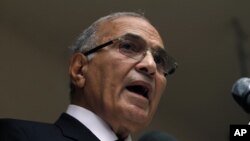Egyptian presidential candidate Ahmed Shafiq has praised the "glorious" revolution that toppled President Hosni Mubarak, and he vowed there will be no "re-creation" of the old regime if he is elected.
Call for unity
During a news conference at his campaign headquarters Saturday, Shafiq called for unity among the Egyptian people. He said nobody will be excluded or pushed aside by the new government.
"Egypt is for everyone. No-one will be excluded and no-one will be pushed aside. Everyone must have a share in this nation."
He also offered this solemn pledge:
"I pledge to every Egyptian that there will be no turning back and no re-creation of the old regime. We will not fight but we will work together. Egypt has changed and there will be no turning back of the clock. We have had a glorious revolution."
Shafiq, a secularist, made his remarks as he appears headed for a run-off against Muslim Brotherhood candidate Mohamed Morsi.
Poll results
Unofficial results from Wednesday and Thursday's presidential polling show Morsi as the top vote-getter, followed closely by Shafiq.
Shafiq was Mubarak's last prime minister before the long-time president lost power in last year's pro-democracy protests.
Former U.S. President Jimmy Carter, whose Carter Center was among several groups that independently monitored the elections, said Saturday the voting process appeared to be fair. But he said the refusal by authorities to let monitors to see the results at some polling stations undermined the "overall transparency of the process."
Final results will be announced Tuesday. A runoff would be held on June 16 and 17.
Runoff
A runoff between Morsi and Shafiq would offer Egyptians a stark choice between candidates from divergent paths.
During the campaign, Morsi delivered fiery speeches and vowed his presidency would be based on Islam, but would not be a theocracy.
A win for Morsi would boost the political clout of Islamist parties who were backed by more than 70 percent of voters in parliamentary elections six months ago.
Shafiq is a former air force commander. He was appointed prime minister in hopes of appeasing the popular revolt. But because of that connection to Mubarak, he is viewed with some suspicion by activists involved in the 2011 movement and polarized voters.
Unofficial results show independent candidate Hamdeen Sabahi also fared well and could gain on Shafiq. He rose steadily in opinion polls over the past week, attracting voters who wanted neither an Islamist nor a former government figure.
Call for unity
During a news conference at his campaign headquarters Saturday, Shafiq called for unity among the Egyptian people. He said nobody will be excluded or pushed aside by the new government.
"Egypt is for everyone. No-one will be excluded and no-one will be pushed aside. Everyone must have a share in this nation."
He also offered this solemn pledge:
"I pledge to every Egyptian that there will be no turning back and no re-creation of the old regime. We will not fight but we will work together. Egypt has changed and there will be no turning back of the clock. We have had a glorious revolution."
Shafiq, a secularist, made his remarks as he appears headed for a run-off against Muslim Brotherhood candidate Mohamed Morsi.
Poll results
Unofficial results from Wednesday and Thursday's presidential polling show Morsi as the top vote-getter, followed closely by Shafiq.
Shafiq was Mubarak's last prime minister before the long-time president lost power in last year's pro-democracy protests.
Former U.S. President Jimmy Carter, whose Carter Center was among several groups that independently monitored the elections, said Saturday the voting process appeared to be fair. But he said the refusal by authorities to let monitors to see the results at some polling stations undermined the "overall transparency of the process."
Final results will be announced Tuesday. A runoff would be held on June 16 and 17.
Runoff
A runoff between Morsi and Shafiq would offer Egyptians a stark choice between candidates from divergent paths.
During the campaign, Morsi delivered fiery speeches and vowed his presidency would be based on Islam, but would not be a theocracy.
A win for Morsi would boost the political clout of Islamist parties who were backed by more than 70 percent of voters in parliamentary elections six months ago.
Shafiq is a former air force commander. He was appointed prime minister in hopes of appeasing the popular revolt. But because of that connection to Mubarak, he is viewed with some suspicion by activists involved in the 2011 movement and polarized voters.
Unofficial results show independent candidate Hamdeen Sabahi also fared well and could gain on Shafiq. He rose steadily in opinion polls over the past week, attracting voters who wanted neither an Islamist nor a former government figure.





